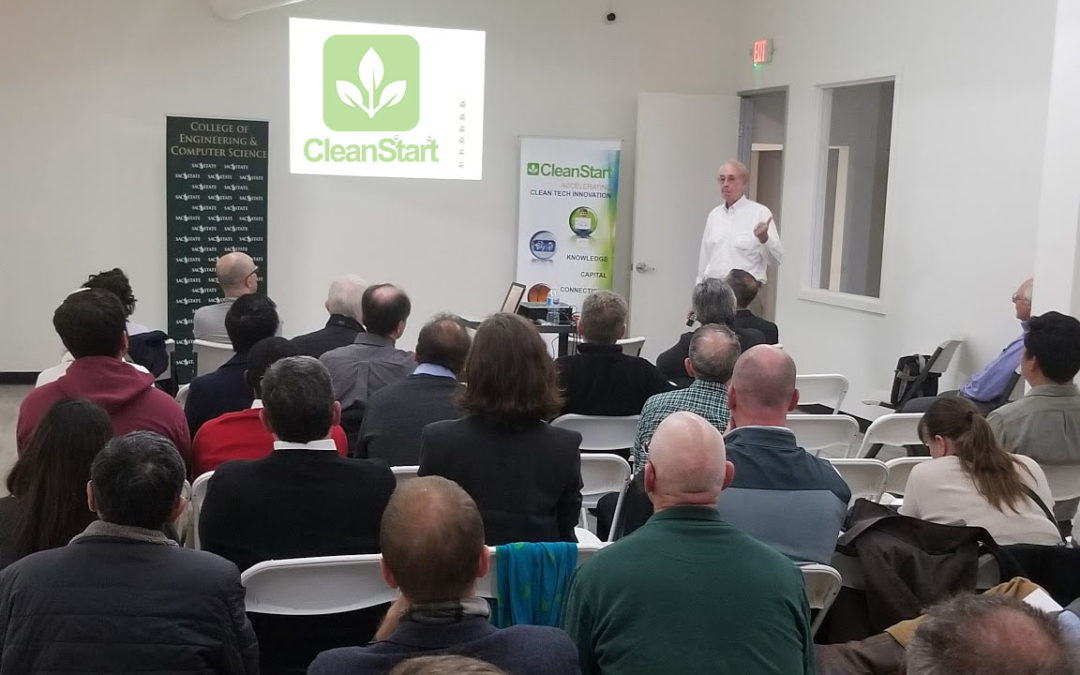Two billion tons of waste per year, the energy equivalent of 1.5 billion barrels of oil per year, or 4.5 million barrels per day. That’s a lot. That’s what the world creates, and mostly just piles it up. A packed room at the new Cowo Campus coworking space heard from four speakers on Tuesday night (Feb. 27) about how they are taking this problem and making an opportunity of it.
Dr. Farshid Zabihian showed how Sac State engineering students are using a small integrated gasifier unit to learn a lot about the process of thermochemical conversion of waste and the practical issues of operation, feedstock injection, and optimizing settings to get the best efficiency at lowest emissions levels. Dr. Z is hoping to keep adding to the sophistication of the unit and eventually use campus waste to provide power to the campus buildings, while giving students meaningful practical experience.
Then we heard from three companies that have been working here for 15 years or more to come up with commercial products that can have a global impact in dealing with that pile of waste. They are all headquartered here, and in the aggregate employ over 100 people here. They are likely to become world leaders in conversion technologies, a significant feather in the cap for our area. Along with a handful of similar companies, they represent a center of expertise unique to our area.
One of the strategies common to all the three presenting companies was to focus on smaller units that can be placed where wastes are already accumulated, rather than incurring the transportation costs of moving wastes to much larger plants. These companies have found that the cost penalties of converting wastes at small scale are more than overcome by avoiding the much larger costs of gathering wastes distributed over a large area to feed a much bigger plant. Smaller is better in looking at the total costs.
Another theme of the evening was the extraordinary commitment of China to being the dominant vendor for waste conversion systems. By one account, China has allocated $600 billion for conversion projects and product development. All three companies are seeing serious interest in their technology and systems from around the world, but mostly from China. It was said that only California has an interest anywhere near that of China.
Dr. Dennis Schuetzle, CTO of Greyrock Energy, explained how they have nearly perfected a modular system for creating a clean, zero-sulfur diesel fuel from waste gas. They are about to commission a unit that will make 450 barrels of diesel per day in West Texas, and have designs for systems up to 5000 barrels per day. They have another 450 b/d plant under construction in Ontario, Canada.
Michael Kleist of Sierra Energy gave an update on their first demo plant now nearing operation at Fort Hunter in Liggett, CA. It uses their FastOx technology which is a 4,000ᵒ F, oxygen-fed thermochemical conversion that can use a wide variety of feedstocks since it completely converts everything to carbon monoxide, hydrogen, and stone-like slag. At the pilot plant, 20 tons per day of post-recycling waste from the base is converted into electricity and diesel fuel, plus the solid slag that can be used for construction or road base. Outputs could also be a hydrogen rich synthesis gas or purified hydrogen depending on what other equipment the customer wants to feed. Sierra is looking for a site for another, larger demo plant, and Sacramento is under consideration.
John Bissell of Origin Materials showed a very different approach involving a biologic conversion of ligno-cellulose wastes (like wood chips, pulping waste, and cardboard) to intermediate chemicals that can then be made into high-value industrial chemicals. In one of the biggest developments for the company, Origin has teamed with global leaders Nestlé and Danone to commercialize 100% bio-based recyclable plastic bottles. Origin is beginning site selection for its first demo plant and the first bottles are expected to hit the shelves by 2020.
Most people in the audience had no idea such companies existed around Sacramento. And that’s the point of these MeetUps–find out what your neighbors are doing in clean and green tech, and then support not only them but many others like them.

ABOUT THE AUTHOR
Gary Simon is the Chair of CleanStarts Board. A seasoned energy executive and entrepreneur with 45 years of experience in business, government, and non-profits.

